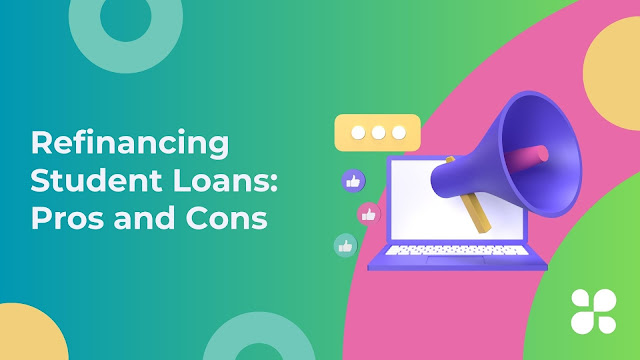For millions of Americans, student loans are a significant source of financial stress. According to the Federal Reserve, Americans owe over $1.7 trillion in student loan debt. Many borrowers choose to refinance their student loans, but it's essential to know the advantages and disadvantages of doing so before doing so. This article will examine the advantages and disadvantages of refinancing student loans and the factors to consider before refinancing.
What is Refinancing Student Loans?
Taking out a new loan to settle one or more outstanding student loans is known as student loan refinancing. Usually, the latest loan's monthly payment or interest rate is lower or both. Both federal and private student loans are refinancingable, but there are some significant differences between the two.
Government-backed federal student loans have advantages like income-driven repayment plans, loan forgiveness programs, and options for deferment and forbearance. Banks and other financial institutions that issue private student loans typically provide fewer benefits and protections for borrowers.
The Benefits of Student Loan Refinancing
Borrowers may benefit from refinancing student loans in several ways, including:
Lessening Interest Rates
Getting a lower interest rate is one of the main reasons borrowers refinance their student loans. Borrowers can save money throughout the loan by paying less interest fees with a lower interest rate.
Less Expensive Monthly Payments
By extending the loan's repayment period, refinancing also makes monthly payments to borrowers more affordable. This may be helpful for borrowers who need help making their current monthly payments.
Simplified Repayment
Borrowers can streamline their repayment process by consolidating several loans into one. Borrowers can make a single monthly payment rather than juggling payments to various lenders.
Fixed Interest Rates
Variable interest rates are standard in private student loans, making budgeting for monthly payments challenging. Borrowers can lock in a steady monthly payment by refinancing to a fixed interest rate.
Possibility to Uncosigner
Some borrowers may have needed a cosigner, such as a parent or family member, to qualify for their initial student loans. Borrowers can eliminate the cosigner by refinancing, giving both parties more financial freedom.
The Drawbacks of Student Loan Refinancing
Refinancing student loans has several potential advantages, but there are also some disadvantages to take into account, such as:
Lost Federal Benefits
If you refinance a federal student loan, you will be denied access to some advantages, including income-driven repayment plans and loan forgiveness programs. These advantages might be more valuable to some borrowers than the potential cost savings from refinancing.
Requirements for Eligibility
Not all borrowers are qualified to refinance student loans. Private lenders have their standards for eligibility, such as a required minimum credit score and annual income. You might only be unable to refinance your loans if you satisfy the lender's requirements.
Effect on credit score
Your credit rating will be reviewed by the lender when you apply for student loan refinancing. Your score may temporarily decline, making obtaining other types of credit more difficult.
Possibility of Increasing Repayment Terms
While extending the repayment period may result in lower monthly payments, it may also result in higher overall interest costs for the duration of the loan. Even if your monthly price is lower, you may pay more interest over time if you are not careful.
Things to Take Into Account Before Refinancing
There are several things to consider if you're thinking about refinancing your student loans, including:
Rates of Interest
To make refinancing worthwhile, the interest rate on your new loan needs to be lower than the interest rate on your current loans.
Present Loan Conditions
You might not want to refinance your loans if enrolled in an income-driven or another federal repayment plan because you might lose access to those benefits.
The Economic Situation
Make sure your financial situation is stable before refinancing. Refinancing might not be the best choice if you have additional debt or are struggling financially.
Future Plans
Consider your long-term goals, such as starting a family or purchasing a home. If you anticipate needing to take out different forms of credit soon, refinancing lowers your credit score and makes it more difficult for you to be approved for other loans.
Finalization
Borrowers who want to cut costs or streamline their repayment can benefit from refinancing their student loans. Before deciding to refinance, it is crucial to weigh the advantages and disadvantages carefully. By considering your options and financial situation, you can decide if student loan refinancing is your best course of action.
FAQs
Should both federal student loans and private student loans be refinanced?
Yes, you can refinance your student loans, both federal and private.
Will my credit score suffer if I refinance my student loans?
Your credit rating will be reviewed by the lender when you apply for student loan refinancing. Your score may temporarily decline, making obtaining other types of credit more difficult.
What distinguishes a fixed interest rate from a variable interest rate?
A variable interest rate can fluctuate over time based on market conditions, while a fixed interest rate remains constant throughout the loan.
What are repayment plans based on income?
Federal repayment programs, such as income-driven repayment plans, modify your monthly payment based on your income and family size.
How can I determine whether I am qualified for student loan refinancing?
Although each lender has different eligibility requirements, most lenders demand a minimum credit score and annual income.



0 Comments